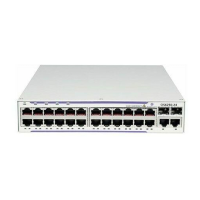QoS Policy Commands
page 39-8 OmniSwitch CLI Reference Guide November 2009
policy validity period
Configures a validity period that specifies the days and times in which a policy rule is in effect.
policy validity period name [[no] days days] [[no] months months] [[no] hours hh:mm to hh:mm | no
hours] [interval mm:dd:yyyy hh:mm to mm:dd:yyyy hh:mm | no interval]
no policy validity period name
Syntax Definitions
name The name of the validity period (up to 31 alphanumeric characters).
days The day(s) of the week this validity period is active. Enter the actual day
of the week (e.g., monday, tuesday, wednesday, etc.).
months The month(s) in which the validity period is active. Enter the actual
month (e.g., january, february, march, etc.).
hh:mm The time of day, specified in hours and minutes, the validity period
starts and the time of day the validity period ends (e.g., 10:30 to 11:30).
mm:dd:yyyy hh:mm An interval of time in which a rule is in effect. Specify a start and end to
the interval period by entering a beginning date and time followed by an
end date and time (e.g., 11:01:2005 12:01 to 11:02:2005 12:01).
Defaults
By default, no validity period is in effect for a policy rule.
Platforms Supported
OmniSwitch 6250
Usage Guidelines
• Use the no form of the command to remove a validity period from the configuration, or to remove
parameters from a particular validity period. Note that at least one parameter must be associated with a
validity period.
• Any combination of days, months, hours, and interval parameters is allowed. The validity period is
only in effect when all specified parameters are true.
• Use the policy rule command to associate a validity period with a rule.
parameter default
days no restriction
months no restriction
hh:mm no specific
time
mm:dd:yyyy hh:mm no interval

